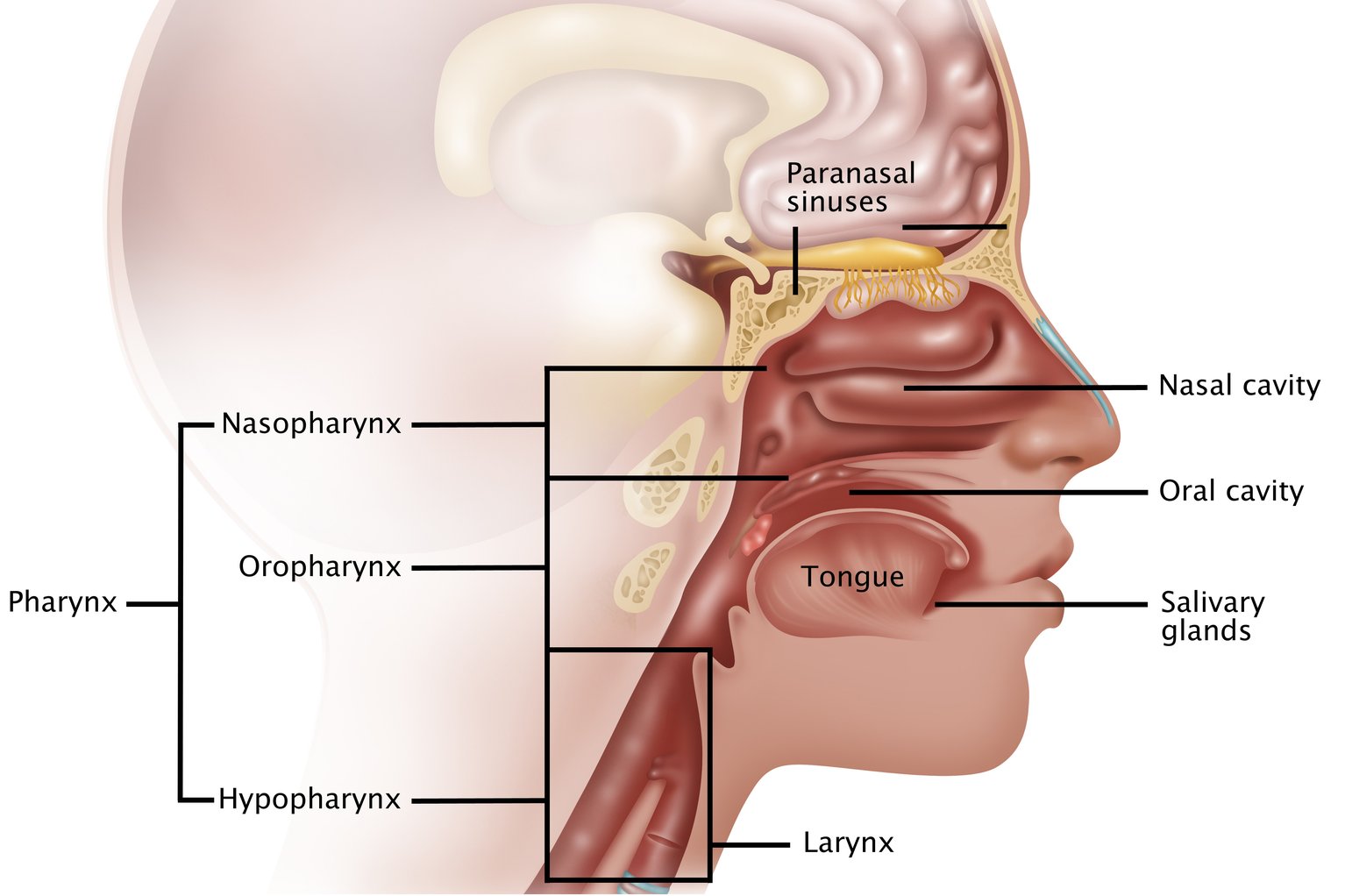
03 Sep Navigating Nasopharyngeal Cancer: From Early Signs to Advanced Treatment
Navigating Nasopharyngeal Cancer: From Early Signs to Advanced Treatment
By Island Hospital | September 4, 2024 12:00:00 PM
Medical Reviewer: Dr. Tang Weng Heng, Clinical Oncologist
Cancer—a word that instils fear in hearts worldwide.
Among the myriad forms of this disease, nasopharyngeal cancer stands as a lesser-known health threat. However, it is one of the most common cancers in Malaysia, sharing the list with well-known cancers like leukaemia, breast cancer, lung cancer, and liver cancer.
Hence, this article aims to shed light on this often-overlooked malignancy. Whether you’re a patient, caregiver, or simply want to be an informed advocate, this guide will equip you with vital knowledge about confronting and conquering this formidable disease.
What is Nasopharyngeal Cancer?
Nasopharyngeal cancer (NPC) originates in your nasopharynx – the junction where the nasal passages meet the upper throat.
This disease arises when the cells lining your nasopharynx undergo abnormal and uncontrolled growth, resulting in cancerous tumours.
Types of Nasopharyngeal Cancer
Nasopharyngeal cancer is classified based on the specific cell type from which it originates.
Most commonly, it begins in the epithelial cells lining your nasopharynx, typically as squamous cell carcinoma. The term “carcinoma” refers to cancer in epithelial tissues – the tissues lining most organs’ internal surfaces and passageways, including your pharynx.
The main types of nasopharyngeal squamous cell carcinoma include:
- Keratinising squamous cell carcinoma: The most prevalent type, where the cancer cells are covered with keratin, a protein found in skin, hair, and nails.
- Non-keratinising differentiated carcinoma: Cancer cells that are not covered in keratin but are still identifiable as squamous cells.
- Non-keratinising undifferentiated carcinoma: Cancer cells without keratin coverage that are difficult to identify as squamous cells.
- Basaloid squamous cell carcinoma: A rare and aggressive type involving both basal and squamous cells.
Stages of Nasopharyngeal Cancer
Nasopharyngeal cancer staging is crucial for determining the extent of the disease and treatment decisions.
There are 2 main staging systems for nasopharyngeal cancer:
The TNM System
This system is utilised for staging various solid tumour cancers, including nasopharyngeal cancer.
It provides a comprehensive evaluation of the cancer’s extent by assessing the primary tumour size (T), the lymph node involvement (N), and the presence of distant metastasis (M).
- T is graded from 1 to 4, with higher grades indicating larger tumour size.
- N score ranges from 0 to 3, with higher grades denoting that nasopharyngeal cancer has spread to your lymph nodes, and many of them have been affected.
- M is graded from 0 to 1, with 1 indicating that the nasopharyngeal cancer has spread to other body parts.
The Number Staging System
Based on the spread extent of nasopharyngeal cancer, the Number Staging System is used to categorise this cancer into 5 main stages:
- Stage 0: The abnormal cells are confined to your nasopharynx’s lining without invading the deeper tissues.
- Stage 1: Cancer is limited to your nasopharynx or has minimally spread to your oropharynx or nasal cavity.
- Stage 2: Cancer has spread to nearby lymph nodes on one side of your neck or has extended to your parapharyngeal space or nearby muscles.
- Stage 3: Cancer has spread to lymph nodes on both sides of your neck and has invaded the bones of your neck and the bottom of your skull, jaw muscles, or the sinuses (air-filled spaces in the skull) around your nose and eyes.
- Stage 4: This advanced stage is subdivided into 4A and 4B:
- 4A: Cancer has spread to the intracranial structures, cranial nerves, hypopharynx, and other nearby areas.
- 4B: Cancer has metastasised to distant body parts, such as your lungs, liver, or bones.
Symptoms of Nasopharyngeal Cancer
As mentioned earlier, nasopharyngeal cancer originates in your nasopharynx, nestling at the base of your skull. This unique anatomical location makes the symptoms of this cancer challenging to detect.
However, a distinctive symptom is the appearance of persistent, painless lumps in your neck. These lumps result from swollen lymph nodes, a sign that the cancer has begun to spread.
In addition to this primary symptom, patients may experience a range of other signs, including:
- Auditory changes: Hearing loss, tinnitus, a sensation of ear fullness, or recurrent ear infections.
- Nasal issues: Chronic nasal congestion (often unilateral), nosebleeds, or bloody nasal discharge.
- Visual disturbances: Blurred or double vision, especially in advanced stages.
- Neurological symptoms: Headaches, facial pain or numbness, difficulty opening the mouth.
- Throat-related problems: Sore throat, hoarseness, difficulty swallowing.
- Systemic effects: Unexplained weight loss in later stages.
If you experience any combination of the aforementioned symptoms, please seek medical attention promptly. Early detection can significantly improve treatment outcomes and the overall prognosis of this cancer.
Causes of Nasopharyngeal Cancer
While the exact cause of nasopharyngeal cancer remains elusive, research has identified several key contributors to its development:
1. Dietary Factors
Consumption of salt-cured fish and meats, common in Chinese and Southeast Asian cuisines, is linked to an elevated risk of nasopharyngeal cancer.
These foods contain nitrosamines and other carcinogenic compounds that can damage your nasopharyngeal cells, leading to nasopharyngeal cancer.
2. Environmental Exposures
Occupational contact with wood dust, formaldehyde, and industrial heat have been associated with higher incidence rates of nasopharyngeal cancer.
These substances can cause irritation and inflammation in your nasopharynx, potentially leading to increased cell proliferation and cancer.
Cell proliferation is the process by which cells grow and divide to make more cells. When this process happens too quickly or out of control, it can lead to problems like cancer, where cells multiply more than they should.
3. Smoking or Exposure to Secondhand Smoke
The smoke from cigarettes exposes your nasopharynx to harmful chemicals. This will damage your nasopharyngeal cells and thus lead to cancer.
It may also activate the Epstein-Barr virus (EBV), the virus that contributes to a higher risk of nasopharyngeal cancer.
4. Heavy Alcohol Consumption
Excessive drinking can lead to deficiencies in crucial nutrients like folate, iron, zinc, and vitamin A, which are essential for maintaining healthy cell function.
Additionally, as your body breaks down alcohol, it produces acetaldehyde, a toxic substance that can damage your DNA and impair its repair mechanisms. Alcohol also stimulates free radical production, potentially promoting tumour growth.
Hence, all these factors collectively contribute to a higher risk of nasopharyngeal cancer and other cancers in the upper respiratory and digestive tract.
5. Viruses
Viruses also play a crucial role in nasopharyngeal cancer development, with Epstein-Barr Virus (EBV) and Human Papillomavirus (HPV) being the key viruses involved.
EBV is strongly linked to most cases; HPV, while less common, can also contribute to some cases.
Both viruses can disrupt normal cell processes and alter cell growth, potentially leading to several types of cancers, including nasopharyngeal cancer.
6. Genetic Predisposition
Certain genetic variations increase susceptibility to nasopharyngeal cancer, especially in HLA (Human Leukocyte Antigen) genes.
Additionally, having a family history of nasopharyngeal cancer further elevates the risk. For instance, first-degree relatives of patients are at a higher risk of developing the disease.
7. Geographical and Ethnic Factors
The markedly higher incidence in specific populations (Southern Chinese, Southeast Asian, North African, and Arctic Inuit) suggests a combination of genetic and environmental factors unique to these groups.
8. Gender
Compared to females, males are 2-3 times more likely to develop nasopharyngeal cancer.
9. Age
While nasopharyngeal cancer can occur at any age, incidence peaks between 50-60 years in non-endemic areas and earlier in high-risk populations.
Given the complexity of nasopharyngeal cancer’s causes, regular check-ups and early detection are vital, especially for those with known risk factors.
If you have concerns about your risk, consult a healthcare professional or consider scheduling a body checkup at a professional healthcare centre like Island Hospital for comprehensive evaluation and guidance.
Diagnosis of Nasopharyngeal Cancer
Accurate and timely diagnosis of nasopharyngeal cancer is crucial for effective treatment and improved outcomes.
Here’s a comprehensive overview of the diagnostic approach:
1. Initial Evaluation
- Detailed medical history, including family history and risk factor assessment
- Physical examination of your head and neck region
- Neurological evaluation to check for your brain, spinal cord, and nerve function.
2. Endoscopic Examination
- Nasopharyngoscopy: A thin, flexible tube with a camera is inserted through your nose to visualise your nasopharynx
- Panendoscopy: A more comprehensive examination to assess the entire upper aerodigestive tract (pharynx, larynx, upper trachea and oesophagus)
3. Imaging Studies
- Magnetic Resonance Imaging (MRI): Provides detailed soft tissue images, crucial for assessing tumour extent and potential spread
- Computed Tomography (CT) Scan: Checks for the size and spread of the nasopharyngeal tumours
- Positron Emission Tomography-Computed Tomography (PET-CT): Combines functional and anatomical imaging to detect primary tumours and metastases
- Ultrasound: Mainly used to assess lymph nodes
4. Biopsy
- Tissue samples around your nasopharynx are taken during the nasopharyngoscopy or panendoscopy to be examined under a microscope.
5. Laboratory Tests
- Epstein-Barr Virus (EBV) test: Measures EBV antibodies and DNA markers in your blood
- Human Papillomavirus (HPV) test: Checks for certain types of HPV infection
- Complete Blood Count (CBC) and other blood tests: Checks for infection and assess your overall health and organ function
How is Nasopharyngeal Cancer Treated?
Treatment of nasopharyngeal cancer is complex and multifaceted, requiring a personalised approach based on the stage of the disease, the patient’s health condition, and the latest medical advancements.
Below is an overview of the current treatment strategies:
1. Radiation Therapy
Typically, radiation therapy is used to treat early-stage nasopharyngeal cancer. It uses high-powered energy beams, such as X-rays or protons, to kill cancer cells.
Common types of radiation therapy include Intensity-Modulated Radiation Therapy (IMRT), stereotactic radiotherapy, and proton beam therapy.
2. Chemotherapy
Chemotherapy utilises powerful chemicals to kill cancerous cells in your body.
It is often used in combination with radiation therapy or targeted drugs for advanced stages of nasopharyngeal cancer.
3. Targeted Therapy
Targeted therapy involves the use of medicines to identify and attack specific cancer cells, aiming to destroy them or slow their growth.
One commonly used medicine is cetuximab, which is effective in slowing down or stopping the growth of nasopharyngeal cancer cells.
4. Immunotherapy
Immunotherapy leverages your immune system to combat cancer. It uses specific medicines to enhance your immune response against the cancer cells, which can help shrink tumours or slow their growth.
5. Surgery
Surgery is not typically used to treat nasopharyngeal cancer because the tumour’s location is close to critical structures like nerves and blood vessels.
However, if the cancer does not respond to other therapies or if it has spread to your lymph nodes, surgery may be performed to remove the tumour or to remove the affected lymph nodes and other tissues in your neck.
Read More:
Living with Nasopharyngeal Cancer
Living with nasopharyngeal cancer involves managing both the physical and emotional challenges that arise from the diagnosis and treatment.
The following are some strategies to help cope and maintain your quality of life:
- Follow a survivorship care plan for monitoring and health improvement.
- Communicate with your healthcare team about any side effects of the treatments to receive appropriate management strategies.
- Seek emotional support from healthcare professionals, support groups, and your loved ones.
- Explore available resources for practical assistance (e.g., financial, transportation, home care, etc. ).
- Stay alert for potential recurrence signs and report them promptly to your healthcare provider.
Measures to Prevent Nasopharyngeal Cancer
Prevention is always better than cure. Here are some key ways to help prevent nasopharyngeal cancer:
1. Avoid Smoking and Exposure to Secondhand Smoke
Smoking and secondhand smoke exposure can heighten the risk of getting nasopharyngeal cancer. Hence, quitting smoking and avoiding exposure to cigarette smoke may help prevent the disease.
2. Avoid Excessive Alcohol
Heavy alcohol use is linked to an increased risk of such cancer, too.
To reduce this risk, it is recommended to limit your alcohol consumption to no more than 1 drink per day.
3. Eat a Healthy Diet
Diets high in salt-cured fish and meat may make you more susceptible to nasopharyngeal cancer. Avoiding these foods, especially at a young age, may be beneficial.
On the contrary, eating a diet high in fruits, vegetables, legumes and nuts and low in dairy and meat may help lower risk.
For tips on incorporating these food groups into your daily meals in healthy portions, check out our article on the Malaysian Healthy Plate!
4. Maintain A Healthy Weight
Maintaining a healthy weight can help prevent various cancers, including nasopharyngeal cancer.
Excess body fat can lead to higher levels of endocrine hormones that may encourage the growth and spread of cancer cells.
Additionally, obesity can weaken your immune system, making it less effective at fighting infections and potentially allowing cancer-related viruses to become more active.
However, there is no sure way to prevent nasopharyngeal cancer completely. Thus, regular checkups are recommended to detect any signs or symptoms of nasopharyngeal cancer early.
If you’re worried about your risk, consider scheduling a full body checkup at Island Hospital for a thorough evaluation and personalised advice from our professionals.
Related Articles:
Fighting Nasopharyngeal Cancer Together with Island Hospital
In the fight against nasopharyngeal cancer, knowledge and expert care are your strongest allies.
As the first hospital in Asia to hold dual hospital-wide and Centre of Excellence (CoE) recognition from the Australian Council on Healthcare Standards (ACHS), the Cancer Centre of Island Hospital stands at the forefront of cancer treatment in Asia.
On the other hand, our Clinical Oncology and Haemato-Oncology Unit is equipped with the latest medical technology and a team of dedicated oncologists, nurses, and paramedical personnel, ensuring personalised and effective cancer care.
Our Ear, Nose, and Throat (ENT) Centre further complements our multidisciplinary approach to nasopharyngeal cancer treatment.
As a tertiary care centre equipped to handle a wide range of ENT conditions, we diagnose, evaluate and treat a broad spectrum of disorders affecting the ears, nose, throat, head and neck, including nasopharyngeal cancer.
Hence, don’t face the journey of fighting nasopharyngeal cancer alone — contact us today to learn how our dedicated team can guide you towards recovery and renewed hope.
Your path to healing starts here.
Read More:
- Oesophageal Cancer: What You Need to Know
- Kidney Cancer: Symptoms, Risk Factors, Treatment & Prevention
- Bladder Cancer: What You Need to Know
- Brain Tumours: Everything You Need to Know
- Looking Out For Skin Cancer
- Colon Cancer – What Do You Not Know?
- Stomach Cancer: Symptoms & Risk Factors
- Testicular Cancer: Rare But Also Common
- Cervical Cancer: The Second Most Common Cancer in Women
Take Charge of Your Health Today!

Introducing our Executive Health Screening Package for just RM760.
This comprehensive health check includes a physical examination, complete medical report, consultation with a health screening physician or specialist, light refreshments, and an exclusive Island Hospital woven bag.
Prevention is always better than cure, so take charge of your well-being by booking our Executive Health Screening Package today!
FAQ
Can nasopharyngeal cancer be cured?
Yes, especially when it is detected and treated early.
However, the likelihood of a cure also depends on other factors like the tumour’s location and the patient’s overall health.
Check out this section to learn more about the treatment options for nasopharyngeal cancer.
What are the causes of nasopharyngeal cancer?
Here are some key factors that contribute to the development of nasopharyngeal cancer:
- Dietary factors
- Environmental exposures
- Smoking or exposure to secondhand smoke
- Heavy alcohol consumption
- Viruses
- Genetic factors
- Geographical and ethnic factors
- Gender
- Age
For detailed information on the causes of nasopharyngeal cancer, please refer to this section.
At what age do people get nasopharyngeal cancer?
In Malaysia, nasopharyngeal cancer can occur at any age, but it is most commonly diagnosed in adults between 50 and 60 years old. It is relatively rare in children and older adults, though cases do occur in these age groups.
Want to learn more about the causes of nasopharyngeal cancer? Visit this section for more information!
What foods prevent nasopharyngeal cancer?
While no specific food can prevent nasopharyngeal cancer, these foods may be beneficial in reducing the risk of getting nasopharyngeal cancer:
- Fresh fruits and vegetables high in antioxidants
- Foods rich in vitamin C and E
- Tea, especially green tea
- Foods high in omega-3 fatty acids
- Whole grains
It is also important to avoid or limit consumption of salt-cured foods, such as salt-cured fish and meats, which have been associated with an increased risk of nasopharyngeal cancer.
Learn more about additional ways to prevent nasopharyngeal cancer here.
Does nasopharyngeal cancer spread fast?
Nasopharyngeal cancer is often considered aggressive because it tends to spread early due to the rich lymphatic drainage in the nasopharynx area. It can quickly spread to nearby lymph nodes and even distant organs like the lungs, liver, and bones.
Thus, early detection and treatment are crucial to prevent its rapid spread. For more detailed information on the symptoms of nasopharyngeal cancer, visit this section.
What can be mistaken for nasopharyngeal cancer?
Several conditions can present similar symptoms to nasopharyngeal cancer, including:
- Chronic sinusitis
- Upper respiratory infections
- Allergies
- Tonsillitis or pharyngitis
- Benign nasopharyngeal tumors
- Other head and neck cancers
- Thyroid disorders
- Middle ear infections
- Epstein-Barr Virus (EBV) related conditions
Due to the similarity in symptoms, it is important to consult a healthcare professional for proper diagnosis if persistent symptoms occur.
Refer here to learn more about the symptoms of nasopharyngeal cancer.







